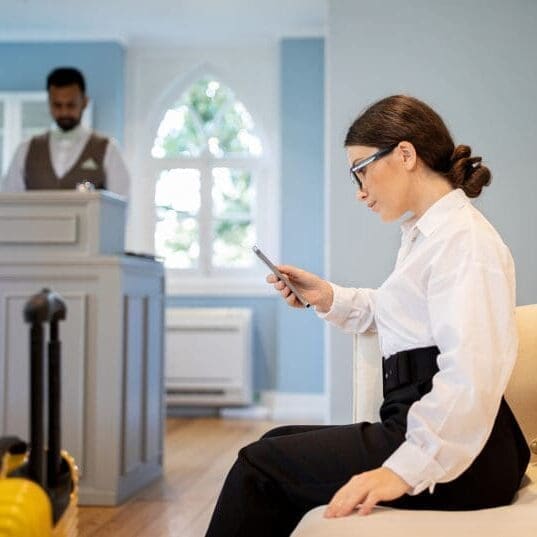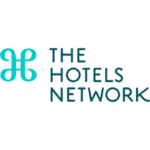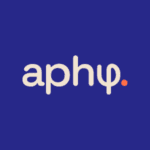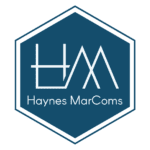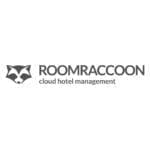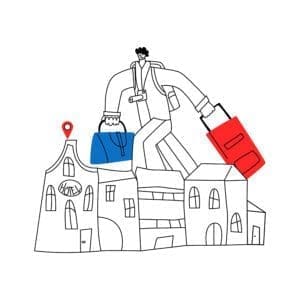 Technology has drastically changed how we live our everyday lives, from using our phones to stay constantly connected to everything and everyone to using online reviews to help us make almost all of our purchasing decisions.
Technology has drastically changed how we live our everyday lives, from using our phones to stay constantly connected to everything and everyone to using online reviews to help us make almost all of our purchasing decisions.
This technology trend has taken hold in the hospitality industry as well, and while some changes may be difficult to implement, technology can definitely help ease some of the stress of the fast-paced hospitality-industry that never sleeps, and provide a better experience for your guests while also saving on many operating costs. We’ve had a look into how the old ways of running a hotel have been replaced and enhanced by new technology, the pros and cons that come with each approach and what’s next for hotel tech. Almost every function in the hotel can be positively impacted by implementing the right kinds of technology and the options are endless: from personalisation tech and guest feedback tech, to widgets and cloud-based systems; from client-facing self-service technologies, to back-of-house solutions, and so much more.
Postcards vs social media posts
Before we all carried computers with internet access and cameras in our pockets, postcards were used as souvenirs and to send greetings back home while vacationing, this was a classic way for guests to share their travel experience with friends and family.
One of the biggest pros of postcards for hoteliers was that the hotel’s branding and advertising could be around for years. Friends and family members of travellers could keep these mementos long after the trip was complete.
However, the obvious drawback of relying on postcards for promotional purposes is the limited reach – only immediate friends and family of the holiday maker would have received a postcard, or seen one stuck in a photo album after the trip. Postcards are also time-consuming and expensive to produce. Today, travellers don’t have to wait for the postal service to get expensive postcards to a handful of friends – they just use their smartphones to post holiday snaps to social media.
Pros for this technology are almost unlimited, for both the hotelier as well as the guest. For example, the extensive global reach, social media posts can reach over 4 billion people. Another notable pro for social media posting is that it is free, both for the guest and the hotel, this means that most guests will make use of it, in fact around 69% of travellers have logged into Facebook within 24 hours of returning from a trip. Lastly, it is quick and easy, using social media platforms has become so omnipresent that most smartphone users can upload to social media in a matter of seconds.
The one down-side is that the hotel has no control over the images that are shared, this means that hotels have to remain photo ready at all times to ensure that the content being shared to billions is an accurate and attractive representation of their establishment. People look to this social proof before booking and its impact on guest bookings seems to be increasing exponentially.
“About 52% of travellers decided to visit a specific destination after seeing its image/video from friends, family, or peers on social media.” Says Max Woolf from Passport Photo Online
So what’s next …
Short video content seems to be replacing photographic content both in terms of existing platforms, for example, the introduction of Instagram and Facebook Reels, as well as newer, fast-growing applications such as TikTok – in fact, a study by Cisco estimated that 82% of all online content in 2022 would be in video format. There is also an emerging trend in which users share more live audio and video content, new applications such as Caffine.tv and Clubhouse are part of this growing concept. Hoteliers and marketers can use this to their advantage by increasing their own production of video marketing, and creating moments guests will want to film as well.
“Our data suggests the amount of online video watched per week, per person, has almost doubled since 2018.” – Wyzowl’s State of Video Marketing Survey
Comment cards vs online surveys
Not so long ago guests were encouraged to leave their thoughts, feelings and suggestions about an establishment on a card left strategically in the room or given to them during checkout.
The major pro is the basic concept; finding out about what your guests were expecting, what you got right, how you can improve – this kind of feedback is invaluable when running a service business. Another pro is that anyone can do it, all you need is a pen and paper, you don’t need any kind of specialised technology or training.
The cons, however, are lengthy. Most guests will generally only fill in a comment card if the stay was either exceptionally good or bad, often giving the hotelier a skewed result. The card itself can get lost, damaged, purposefully misplaced by a disgruntled employee or can be illegible. Lastly and most notably, it is difficult and time-consuming to attempt to extract and consolidate the data collected on comment cards in order to identify trends, past results and behaviours and so on.
Online surveys – digital surveys accessed by guests via an email invitation after their stay – are certainly one of the most important new technologies to adopt in a hospitality business.
The pros of the online survey are numerous; it allows for guests to be more honest in their feedback because they aren’t face-to-face with staff, it encourages guests who have had ‘average’ stays to provide the hotel with commentary resulting in more valuable and accurate data, it can involve “smart survey” techniques where guests are shown specific questions based on their answers to the preceding ones.
Most importantly, collecting guest feedback digitally allows for an increase in the amount and accuracy of the data whilst limiting the time taken to complete the survey for the guest.
One of the only cons is that hotel staff must request for and record guest emails accurately. Which is a challenge that can easily be overcome.
So what’s next …
Thanks to the ubiquity of storing data in the cloud, integrations between hotel technologies are becoming deeper and more big data is becoming available to hotels of all shapes and sizes. Having technology that allows you to identify patterns in guest demographics, consolidate and aggregate your hotel’s data, and simultaneously look at competitors’ data can allow management to amplify their strategic planning across all departments.
The big data can be tracked over time which gives management a way to visualise the effects of strategy implementation. Staff incentives, bonuses and training can be implemented based on accurate customer data. It also enhances your marketing efforts, as hotels are able to segment customers based on survey results and only address marketing material to appropriate clients, saving on marketing costs while improving response rates.
Brochures vs websites
Traditionally, hotels would advertise themselves via glossy print brochures. Brochures could be strategically placed both within the establishment itself for passing trade as well as at airports, bus stations and information kiosks or tourist centres. There were even agencies who would manage your brochure distribution to ensure the print content reached the correct target market.
The benefits of the print media is that they could be physically handed out at trade shows and events. They are generally eye catching and encourage tourists visiting your area to grab one as they pass by information desks. However, print media always has a con in relation to the cost per reach (CPR). This type of advertising is costly and has a very limited reach. Furthermore the information can quickly become outdated.
Websites have become a technology commodity that a hospitality business can’t do without. Websites allow for the same high image value and can showcase your property just as the brochures could, yet they are up-to-date with regards to special offers, latest information and most recent images available. It is also possible to make bookings directly with the hotel, advertise special offers and events and often properties have live chat tools which guests can use to talk directly to a staff member to answer questions they may have in real time.
One of the advantages of using a website is the CPR, websites can be accessed from anywhere in the world, plus the additional benefit of being able to update the information ensures that it reaches the right customers at the right time. Unfortunately, websites can be costly to build and host especially if you are lacking the necessary skills in-house and have to outsource these tasks. In spite of the initial costs to develop the website the CPR is still an attractive equation. In fact, according to Kalibri Labs one quarter of all hotel bookings are made via the hotels website.
It is best to try and optimise your website‘s potential by enhancing your SEO, ensure that your site is mobile friendly, streamline your user experience on the site to encourage direct bookings and lastly certify that your website copy is well written and tells a story to appeal to users’ emotions.
What’s next …
Virtual tours have benefits which are two-fold, they help to generate interest when guests land on your webpage, it keeps them engaged with the site for longer than static images and they ultimately drive an increase in direct bookings.
By showing guests exactly what they can anticipate from your establishment you create precise guest expectations, which helps to close customer service gaps. Often when guests’ expectations are more accurate they report having a more satisfying stay which enhances customer retention, positive reviews and potential WOM marketing.
Have a look at one of the best rated virtual tours on Youtube here.
Word of mouth vs online reviews
One of the fundamental marketing channels is word of mouth. Regardless of any external marketing efforts by the company in question, one given is that customers will talk to friends and family about their purchases and even more specifically their most recent holiday. This is especially true if guests have had a remarkable stay, either positive or negative.
Generally, word of mouth marketing is the most trusted form of marketing, people view recommendations from friends and families as something they can count on. One of the pros is that it is completely free for the hotel marketing department, however, to get it right you need to make sure guests are always having a satisfactory, or even better, a delightful stay with the hotel. Conversely, word of mouth marketing can be very damaging if negative, and is impossible for the hotelier to control.
While word of mouth will continue perpetually, technology has now allowed guests to convey their thoughts and feelings to a much wider audience via online reviews.
An online review is a way for guests to express exactly how they found their stay, but to thousands of potential readers via online platforms such as online travel agents (OTAs) or review sites. Online reviews have very similar pros and cons to the traditional word of mouth marketing, they can be seen as very reliable, especially when customers include their own photographs of the hotel. Again on the converse, online reviews can be hugely damaging when negative and, while the hotelier does not have control over the review written, they can (and should) respond to each review.
What’s next …
Guest feedback intelligence. With the increasing number of online reviews it is essential that hotels adopt some form of guest feedback strategy. Technology is making it easier to collect, consolidate, analyse and visualise customer data. Guest feedback software makes it easy for employees in different departments to pull data in a format that aids in their decision making process. Gaining accurate and easy to use data of one’s clients, can aid in creating effective and tailor made marketing strategies. It also helps hotels to get greater repeat guests and increase their spend per stay.
Another major benefit of using a guest feedback system is that you are able to increase your reviews across various channels, often leading to greater online visibility, improved word of mouth advertising, and a sense of trustworthiness with potential customers.
Booking diary vs PMS ( property management system)
Historically, hotels would manage their bookings via pen and paper reservation diaries, ring bound folders or the iconic Whitney rack. One of the obvious advantages of this method is that it is cheap (aside from the cost of a book and pencil). However, there are many cons and hidden costs to this method. Firstly, bookings may not be inputted into the book, once they are inputted they could be overlooked, details of the reservation taken down incorrectly or be illegible. Furthermore, the data captured in the reservations book can not be shared with different departments, or linked with other technologies.
Most hotels have now moved to a property management system. PMSs are used to digitally record room inventory and occupation data. It also allows the reservations management to record data on specific guests, preferences and points to note. One of the most noteworthy advantages of a PMS is that it can integrate with other hospitality software such as online payment systems, OTAs like booking.com, guest feedback technology and many others. This integration also allows for more automation and less legwork for reservation managers. For example, when bookings are made through the PMS, the room is removed from any OTA listings and vice versa, avoiding any double booking situations.
While PMSes seem to be ubiquitous in the hospitality industry, there are some disadvantages to using a digital system. One of which is the data protection regulations in the hotels country of origin, each PMS must adhere to certain legal frameworks regarding protection of guest information. Additionally, PMSes can occasionally be costly and time-consuming to set up correctly and multiple staff from various departments would have to be trained on the operation of the program.
What’s next …
Cloud based PMSes are the way forward. The future is in cloud-based platforms which allow hotels to have all of the benefits of a traditional PMS system while reducing any hardware and software expenses, creating a more easy to use platform which simplifies the running of the hotel and spans multiple departments.
One of the many benefits of a cloud-based system is the ability to access the information from anywhere at any time, hotel owners can check in on their PMS from anywhere in the world via mobile devices while department heads and employees can login and gain live data that influences their decision making and work processes. Additionally often the cloud based providers offer a pay as you need system so you are only paying for the features that are important in your property.
Real time integrations with multiple applications can also save time, effort and improve guest experience. Customer data such as guest preferences, special requests and demographics can be gathered, tracked and stored to create a better customer experience in the future, tailor made marketing campaigns and communication with each client before, during and after their stay.
Check in forms vs online check in
Hotel check in is always seen as a frustrating part of a guest’s experience, generally guests who have been travelling are eager to go up to a room to rest, relax, unpack or freshen up. Historically, hotels used check-in forms which were completed by guests on arrival. The pro of using old-school pen and paper forms is that they are easy and cheap to print.
One of the most basic but essential pieces of information gained from check in forms is the guest’s contact details. Often when the details are written down by guests on a physical form they can be incorrect, illegible, lost or damaged. It is also then time consuming for employees to have to input the data into some form of digital format, or worse, the data is left in binders in the hotel and unused.
Using online check in processes can solve many of the downfalls identified in the pen and paper method. Most notably the guests can complete the check in process before they arrive at their destination. This saves time for both the guest and the staff. The online check in can also integrate with multiple other hotel technology, i.e. saved data on guest preferences on air conditioning settings, which can be automatically switched on (or off) on check in prior to the guests arrival.
Completing the check in process online also solves the problem of illegible information. You will have confirmed details, instantly saved in a digital format, making any further correspondence with guests easy to navigate. The data can also be used to personalise guests’ stays and tailor marketing and loyalty campaigns to the guest preferences.
What’s next . . .
While online check in seems to be the way of the future, there are added extras in this area. For example hotel apps, a hotel can have an app that manages multiple areas of the guests journey, from check in to check out. These apps can also work as a 24/7 online concierge, offer chat-bot facilities, control room preferences and even be used to order room service. The apps can be used to send out personalised and relevant material to upsell areas of the hotel.
The world of hotel technology can be intimidating at first glance, but considering problems that the technology can solve in the day-to-day areas of the hospitality business it’s clear that adopting hotel tech is no longer a nice-to-have but a must have to stay competitive. The more integrated all of the aspects of your hotel’s technology strategy can be, the better the service you can offer your guests, and, more than that, the more data you can generate and consolidate, which allows your hotel to distribute accurate and effective marketing to a more targeted audience.











